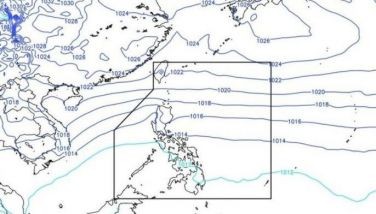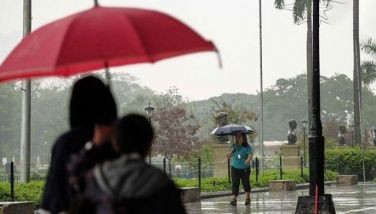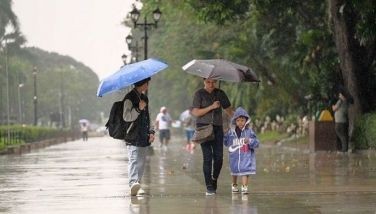RP-Brunei gas pipeline mulled
December 2, 2005 | 12:00am
The ASEAN Council on Petroleum (ASCOPE) is studying the feasibility of putting up a gas pipeline from Brunei to the Philippine shore line, particularly in Palawan province, a top energy official said.
In a press conference, Philippine National Oil Co. (PNOC) president Eduardo V. Mañalac said the task force created by ASCOPE for the Trans-ASEAN Gas Pipeline (TAGP) will look into the viability of building the gas link-up facility between the two countries.
"The task force assigned to do the TAGP has made a significant progress. One of the efforts which was agreed upon was to take up the economics and feasibilities of the proposed pipeline from Brunei to Palawan," Mañalac said.
He said the task force also gave importance to the decision on the actual feasibility of each segment of the proposed TAGP.
ASCOPE created the Trans-ASEAN Gas Pipeline Task Force (TAGP-TF) led by Malaysia in early 1999.
In 2001, there was a proposal on the supply and transport for natural gas via a proposed Philippines-Sabah sub-sea pipeline but this did not materialize.
The proposal was supposed to have landings from Sabah to either Batangas or Bataan. This should have facilitated and help in the supply of Malampaya gas to Luzon by 2006.
The ASEAN Energy Ministers have underscored the need for cooperation among member countries to establish an inter-connecting arrangements for natural gas within ASEAN through the TAGP.
Mañalac said with the continuing volatility of oil prices in the world market, natural gas has become the alternative fuel in the Southeast Asian region being environment-friendly and clean-burning fossil fuel due to its low levels of sulfur oxide and nitrogen oxide emissions.
The TAGP was signed by the governments of Brunei Darussalam, Cambodia, Indonesia, Lao People’s Democratic Republic, Malaysia, the Union of Myanmar, the Philippines, Singapore, Thailand Vietnam.
The importance of ASEAN energy cooperation was further underscored in the Bangkok Summit Declaration which stated that ASEAN shall ensure greater security and sustainability of energy supply through diversification, development and conservation of resources, the efficient use of energy, and the wider application of environmentally - sound technologies; and, as reinforced in the ASEAN Vision 2020 pursuant to the ASEAN Second Informal Summit in Kuala Lumpur, calling for cooperative activities aimed at establishing interconnecting arrangements for natural gas, among others, within ASEAN through the TAGP project.
In a press conference, Philippine National Oil Co. (PNOC) president Eduardo V. Mañalac said the task force created by ASCOPE for the Trans-ASEAN Gas Pipeline (TAGP) will look into the viability of building the gas link-up facility between the two countries.
"The task force assigned to do the TAGP has made a significant progress. One of the efforts which was agreed upon was to take up the economics and feasibilities of the proposed pipeline from Brunei to Palawan," Mañalac said.
He said the task force also gave importance to the decision on the actual feasibility of each segment of the proposed TAGP.
ASCOPE created the Trans-ASEAN Gas Pipeline Task Force (TAGP-TF) led by Malaysia in early 1999.
In 2001, there was a proposal on the supply and transport for natural gas via a proposed Philippines-Sabah sub-sea pipeline but this did not materialize.
The proposal was supposed to have landings from Sabah to either Batangas or Bataan. This should have facilitated and help in the supply of Malampaya gas to Luzon by 2006.
The ASEAN Energy Ministers have underscored the need for cooperation among member countries to establish an inter-connecting arrangements for natural gas within ASEAN through the TAGP.
Mañalac said with the continuing volatility of oil prices in the world market, natural gas has become the alternative fuel in the Southeast Asian region being environment-friendly and clean-burning fossil fuel due to its low levels of sulfur oxide and nitrogen oxide emissions.
The TAGP was signed by the governments of Brunei Darussalam, Cambodia, Indonesia, Lao People’s Democratic Republic, Malaysia, the Union of Myanmar, the Philippines, Singapore, Thailand Vietnam.
The importance of ASEAN energy cooperation was further underscored in the Bangkok Summit Declaration which stated that ASEAN shall ensure greater security and sustainability of energy supply through diversification, development and conservation of resources, the efficient use of energy, and the wider application of environmentally - sound technologies; and, as reinforced in the ASEAN Vision 2020 pursuant to the ASEAN Second Informal Summit in Kuala Lumpur, calling for cooperative activities aimed at establishing interconnecting arrangements for natural gas, among others, within ASEAN through the TAGP project.
BrandSpace Articles
<
>
- Latest
- Trending
Trending
Latest




























